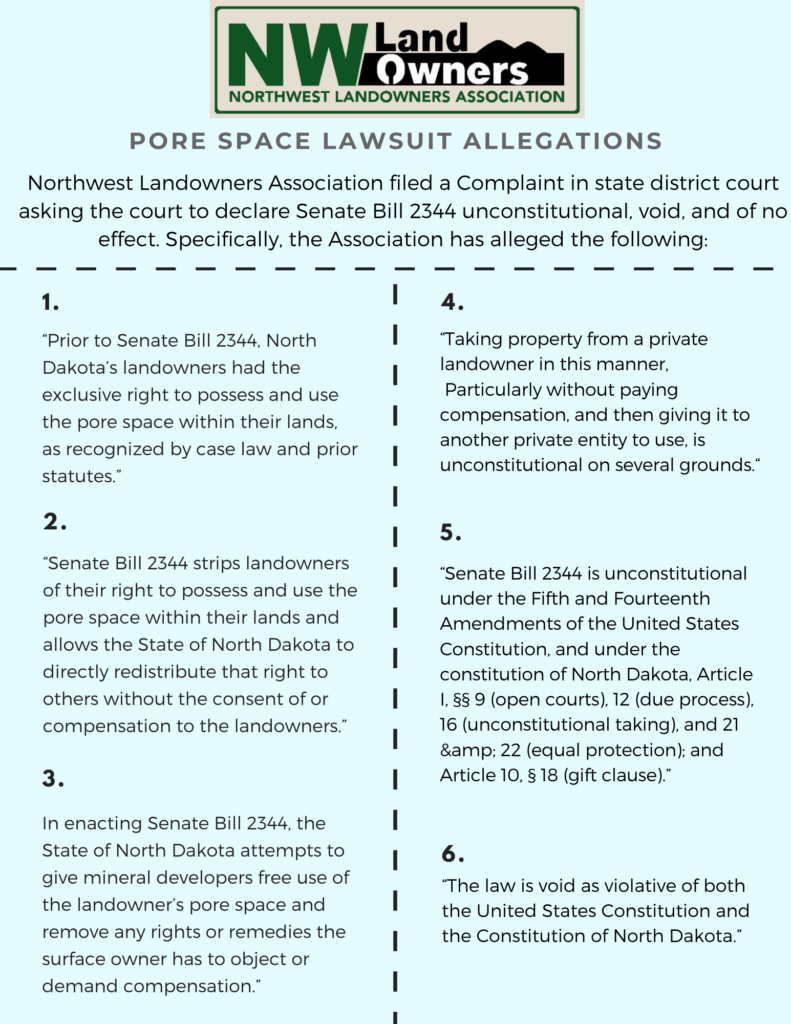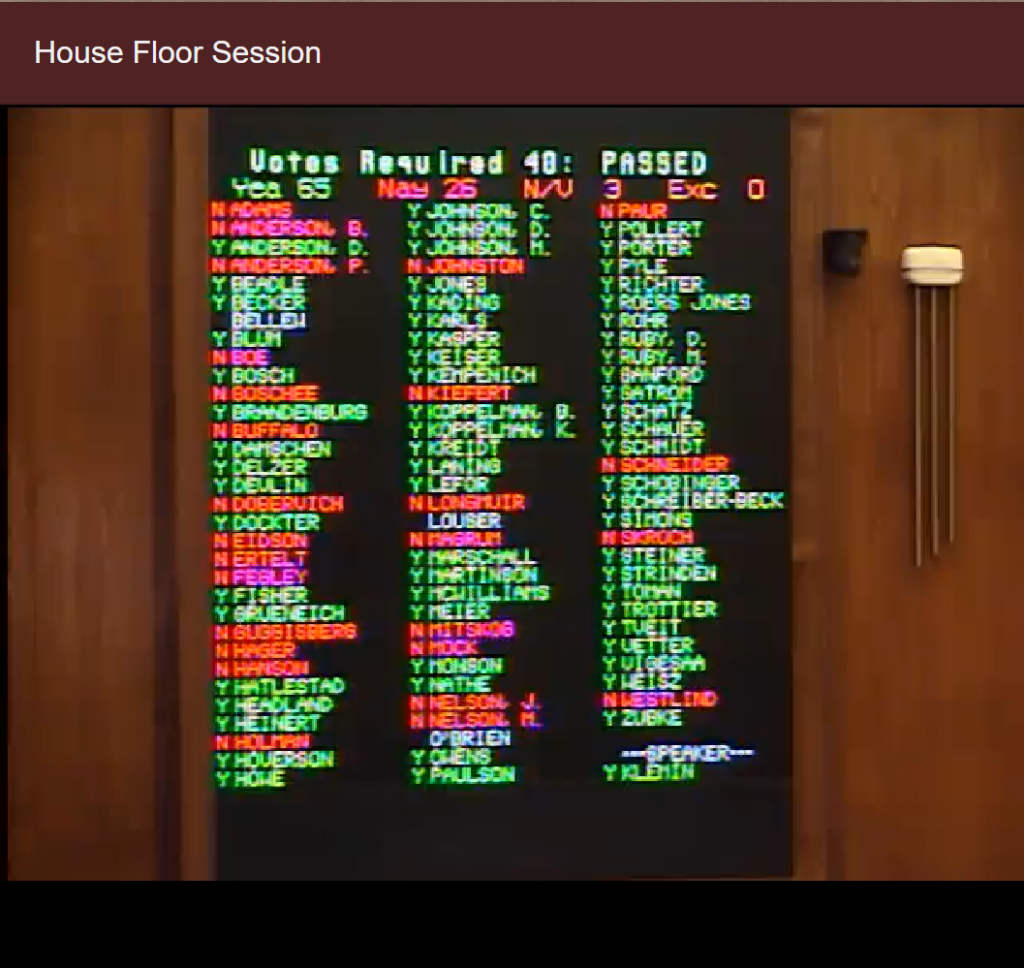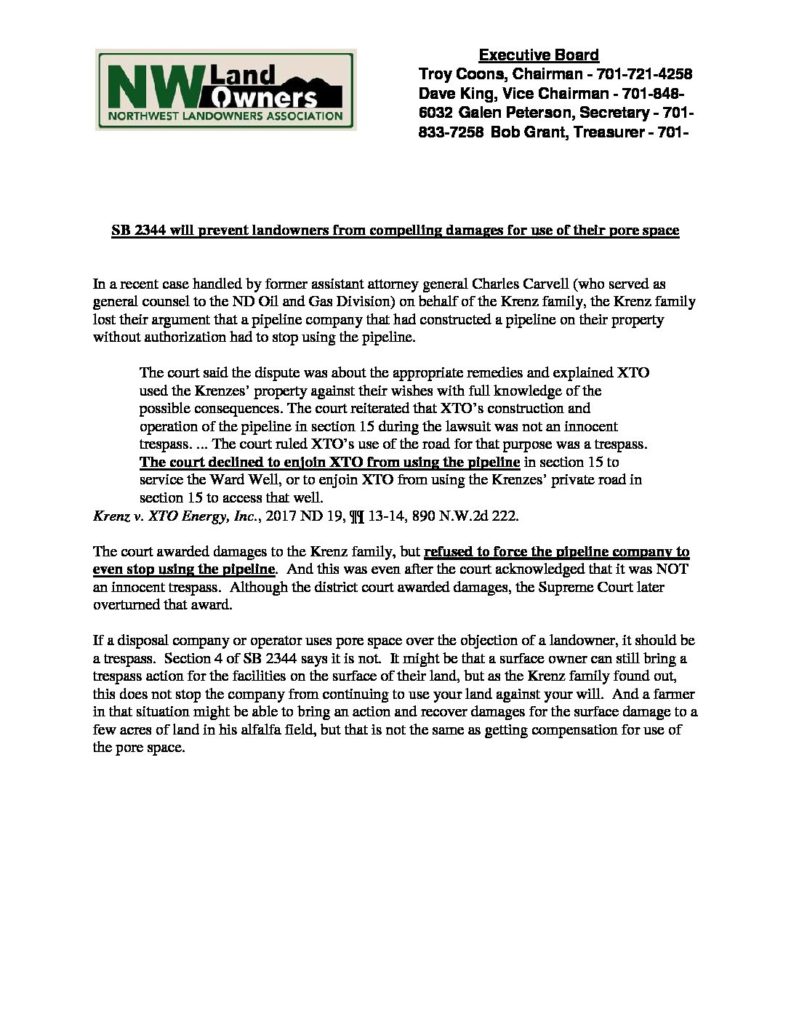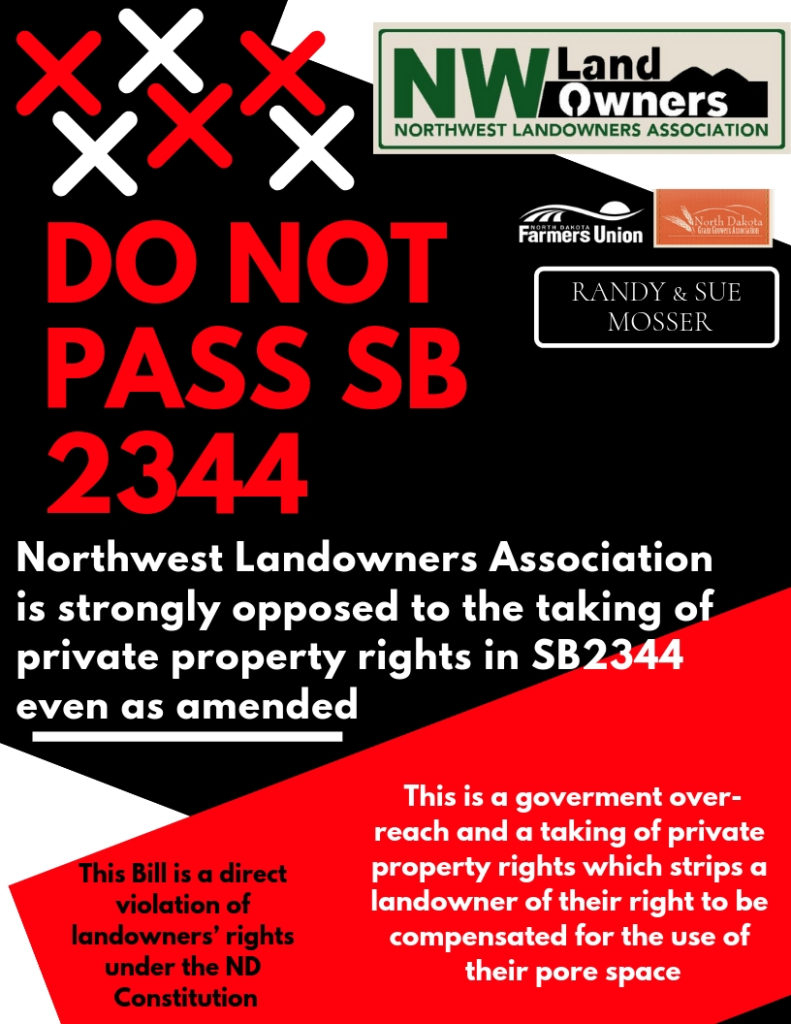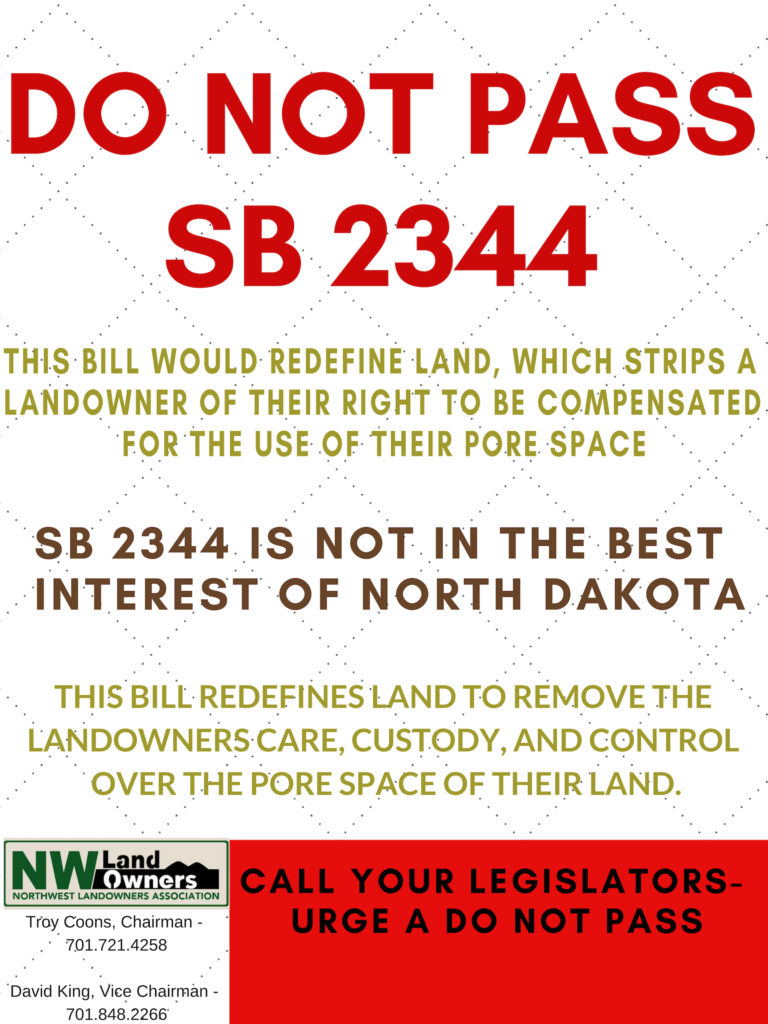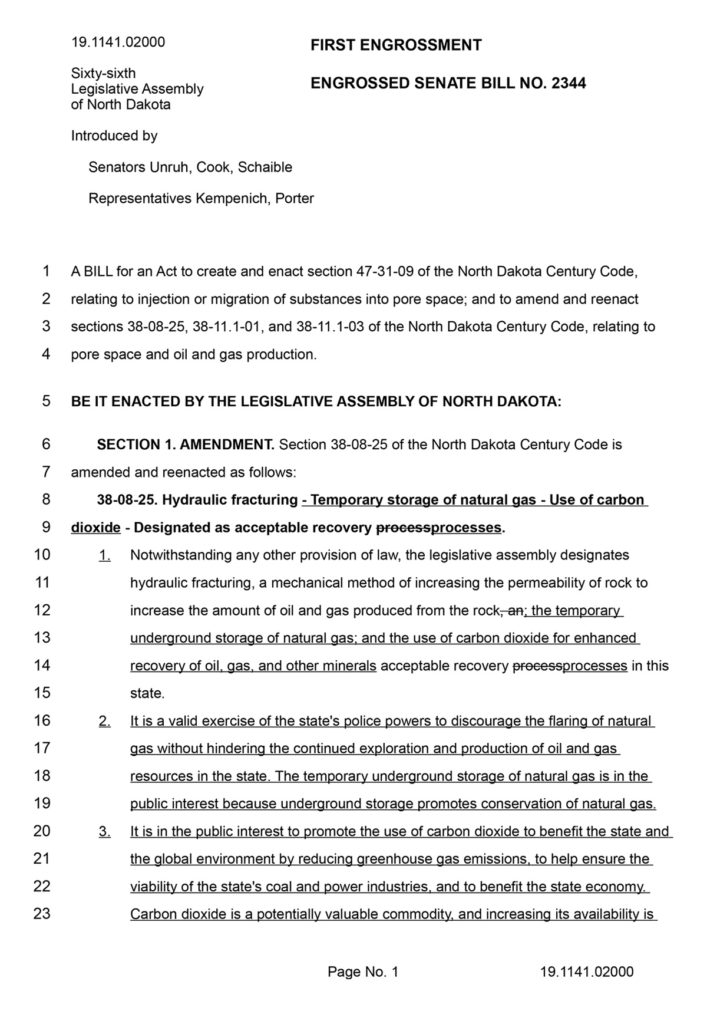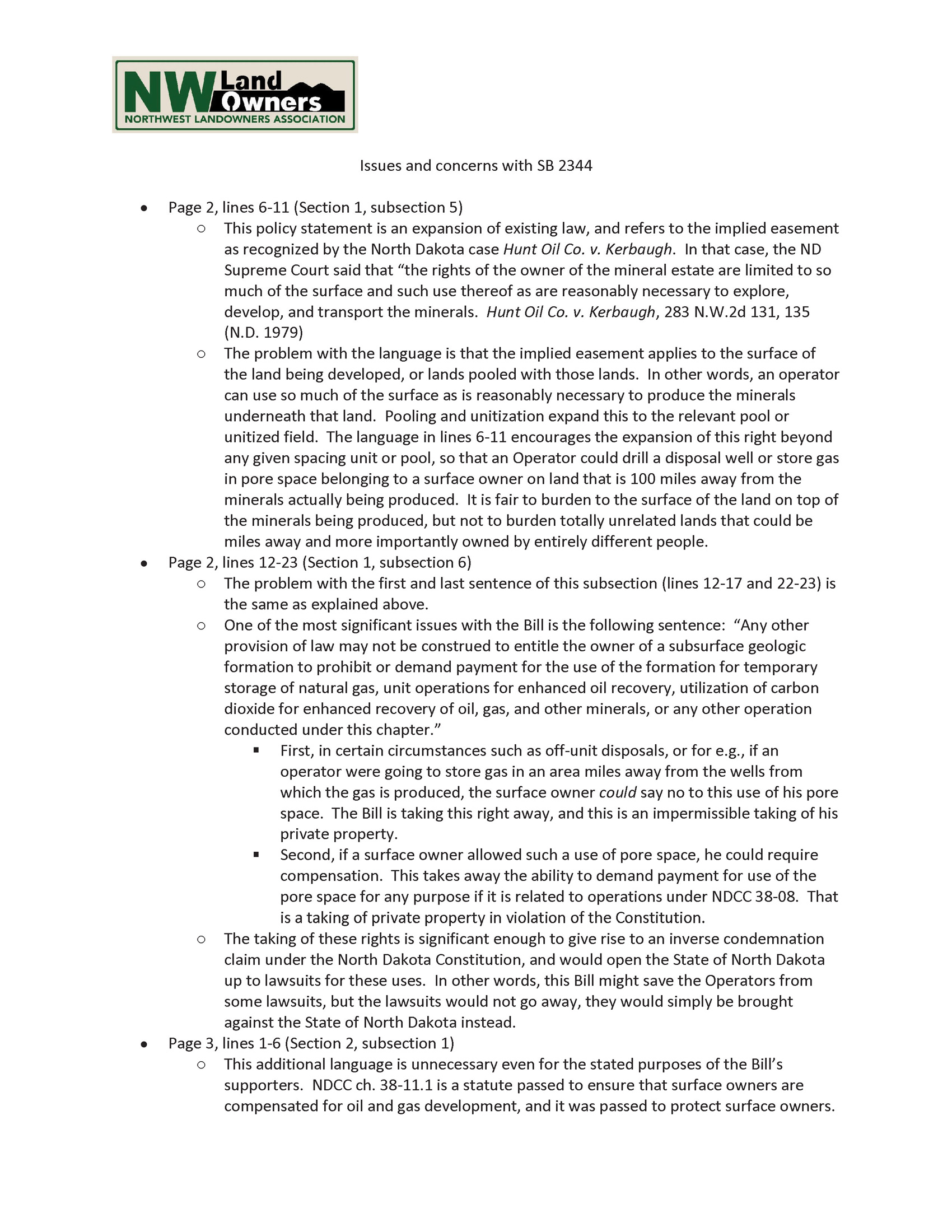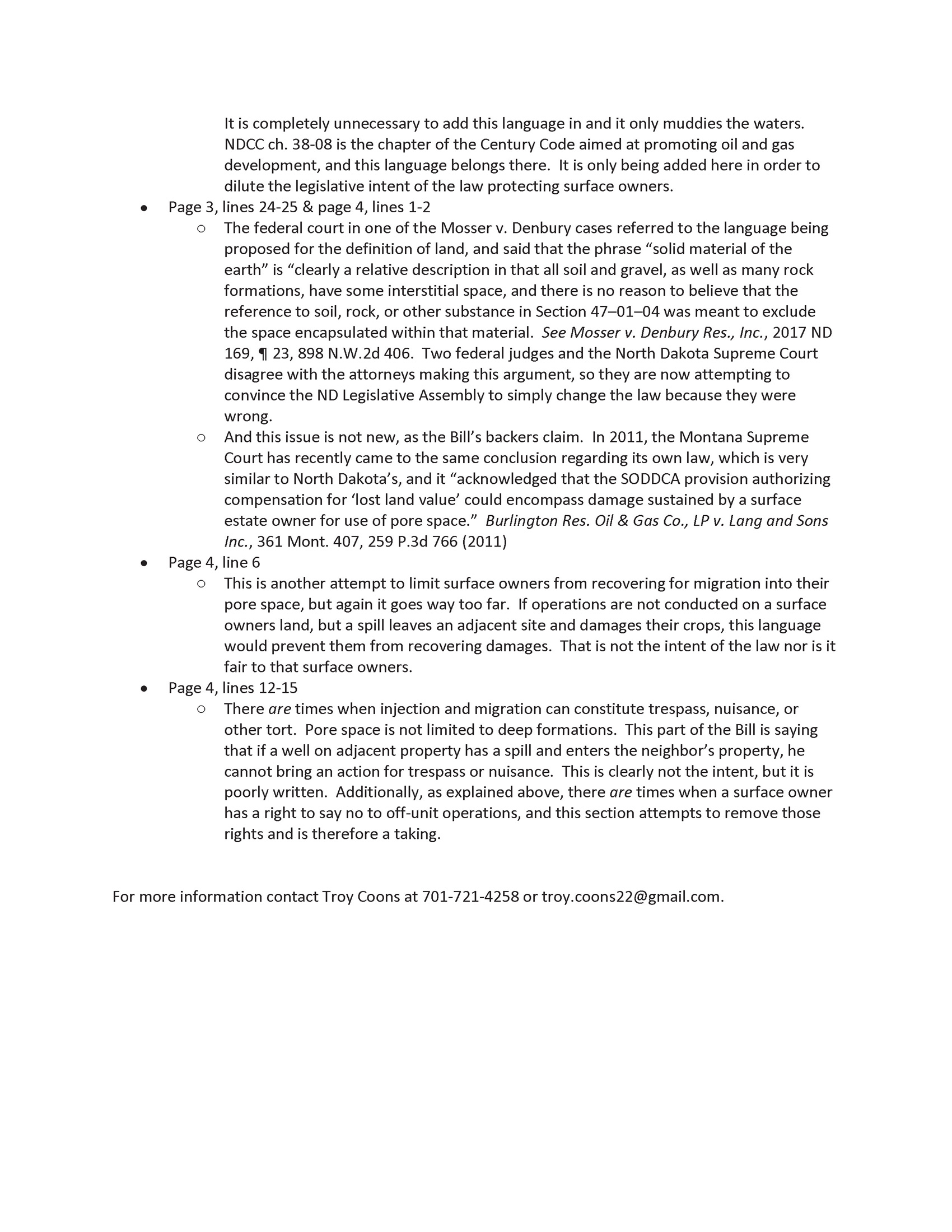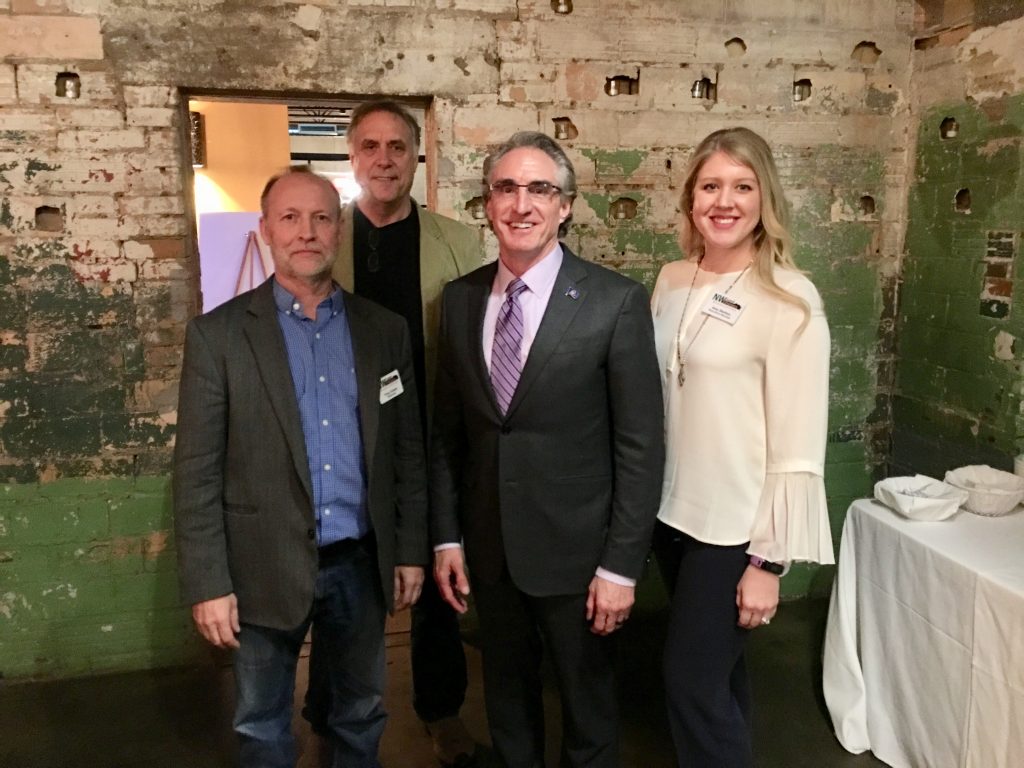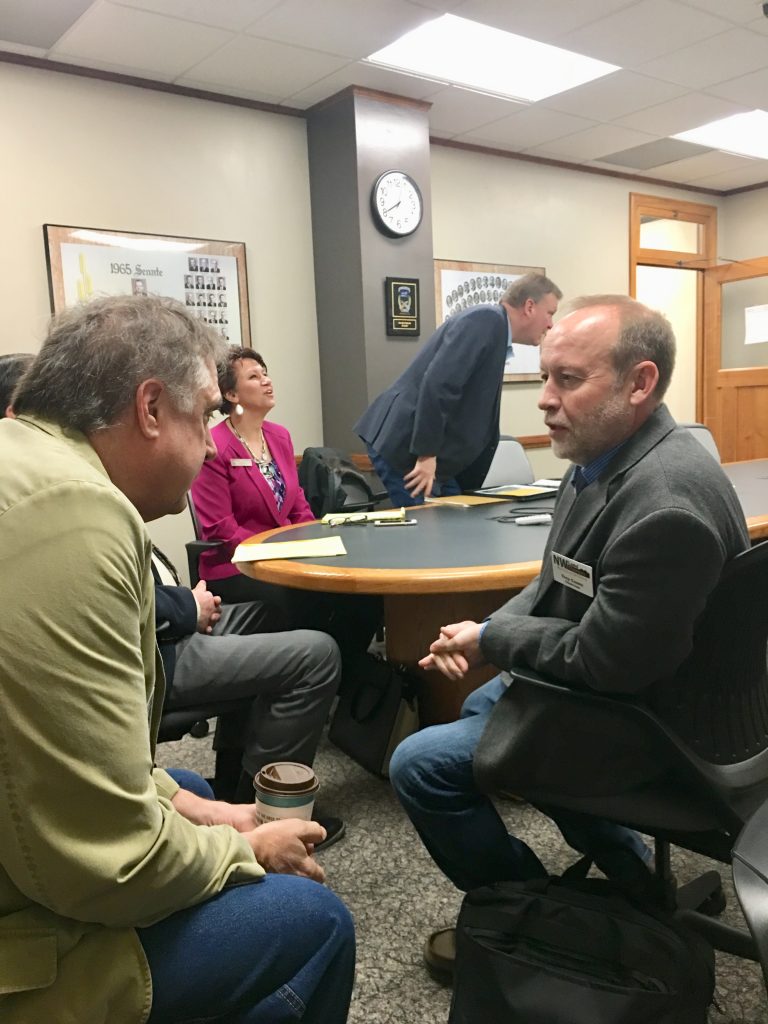Click here to comment!
2021 Legislation F.A.Q
- What does SB 2065 do, and why does the oil and gas industry want it?SB 2065 creates a regulatory and permitting system for underground gas storage. Although the Industrial Commission currently has authority to permit gas storage facilities, it also wanted the ability to force owners of the surface estate to allow storage on and in their property, even if they did not want to allow it themselves. This is referred to in the law as “amalgamation” because the goal of the Industrial Commission is to force all of the owners of pore space to allow a project to use the pore space.
- What are the concerns for a landowner?
The bill currently will have the amount of “equitable” compensation owed to the
surface estate owner for use of the pore space determined by the Industrial
Commission. The Industrial Commission promoted prior efforts to take away the
landowners’ rights to compensation for use of their pore space, and Lynn Helms,
speaking on its behalf, testified in favor of SB 2344 and stated that no gas storage
project will be “economic” if landowners are compensated for use of their pore
space. Now these same individuals want to be the ones to determine the amount
of compensation received. For that reason, NWLA asked for an “escape valve” in
order to allow a landowner to go to court and have a jury decide the amount of
compensation. We proposed that this would happen after the Industrial
Commission makes its decision. In this way, if the Industrial Commission is
genuine about its desire to fairly compensate landowners, then it will likely be a
nonissue anyway. Legislators on the subcommittee refused to consider this,
however, and voted through legislation without any right to an independent
assessment of compensation. The other related concern is that “equitable
compensation” is the term used to describe what a landowner must receive, but it
is intentionally undefined and the Industrial Commission, Petroleum Council, and
lawmakers refused to add a definition to this term. NWLA proposed to define it
as being, at a minimum, “just” compensation, which is the compensation required
by the Constitution for a taking of property. NWLA also asked to include
damages as allowed by the Surface Damages Act, which is the law passed by the
Legislative Assembly to require compensation to surface estate owners for oil and
gas development, and was therefore designed specifically for this situation.
NWLA submitted a proposal that was thoroughly researched, and was modeled
after legislation in over a dozen other states that have legal frameworks for doing
gas storage. Despite the fact that these other states are already doing this with
laws on the books, our Legislative Assembly chose to ignore what over a dozen
other states have already done and break new ground of its own with the laws it is
drafting. - Why does NWLA say that SB 2065 is unconstitutional?
SB 2065 allows the Industrial Commission to force nonconsenting landowners to
permit their property to become part of an underground storage facility. The law
has moved in the right direction since SB 2344 in 2019 because now the Industrial
Commission recognizes that compensation must be paid when private property is
taken. Unfortunately, the law only states that “equitable” compensation must be
paid, and that term is undefined. The state and federal constitutions require that
“just compensation” be paid when private property is taken by the government,
but the use of the term “equitable compensation” is a transparent attempt to
sidestep this issue. Courts require “just” compensation to be paid for a taking of
private property, and there is over a century of case decisions explaining what that
is. Lawmakers refused to include “just” compensation in the definition of
“equitable” compensation, which further indicates that what the Industrial
Commission will determine is “equitable” compensation will be far less than is
required for “just” compensation.In addition to the failure to require “just” compensation, the law also does not
allow a landowner to have a jury decide the amount of just compensation. Under
the North Dakota Constitution, “Compensation shall be ascertained by a jury,
unless a jury be waived.” N.D. Const. art. I, § 16. Landowners have a
constitutional right to have their compensation determined by a jury rather than by
the Industrial Commission. - What is the argument that SB 2065 is constitutional?
There is not one as far as we know, or at least not one that has been discussed
openly. This is significant because in 2019 when the Legislative Assembly
passed SB 2344, attorneys for the State and the Petroleum Council argued that the
law was not at all unconstitutional. A court in North Dakota has since disagreed,
but the important point is that there were arguments that the legislation was
constitutional and should therefore be passed. Rep. George Keiser, who chaired
the SB 2065 subcommittee, indicated that the subcommittee was advised that all
versions under consideration may be unconstitutional. During the subcommittee
meetings, an attorney from North Dakota Legislative Council was asked to sit in,
and he repeatedly advised the subcommittee that NWLA’s concerns were
well-founded and that the legislation was indeed unconstitutional. - How can legislators vote for legislation that is unconstitutional?
Legislators take the same oath of office as lawyers, judges, and other elected
officials. The main part of that oath is: “I do solemnly swear (or affirm as the
case may be) that I will support the Constitution of the United States and the
Constitution of the State of North Dakota.” N.D. Const. art. XI, § 4. Legislators
were told by their own attorneys that SB 2065 is unconstitutional, and voted for it
anyway. This violates their oath of office. It is not a case where the legislators
can say they did not know it was unconstitutional because their attorney told them
in an open meeting it was not, and they admitted it themselves on record. - I heard that the Industrial Commission will allow private contracts rather than setting a price, is that true?
In order to force landowners into a storage facility, the applicant must get at least
60% of the landowners to sign on willingly. In this way, there will be some
“buy-in” from landowners before other landowners are forced into the storage
unit against their will. In this way, it is true there will be some landowners who
have already agreed on a price. But whether that is a fair price or is sufficient to
be “just” compensation is another question, and for many of these facilities, the
industry has said they will be purchasing the surface and a large amount of the
pore space they will use, so it may be that the “prices already paid” to landowners
are prices paid by a company to its own affiliate company and as such they will
not reflect “just compensation” or market value in any way. - None of these projects will happen if landowners demand just compensation, so shouldn’t we allow this to happen?
First, there is no indication that none of these projects will move forward. During
the meetings on SB 2065, there was only one project developer present who
indicated it had actual plans to move ahead, and the developer’s lobbyist stated in
the meeting that the provisions proposed by NWLA would not be a barrier to that
project. Whether paying adequate “just” compensation will stop other projects is
yet to be seen, but it is not even within NWLA’s power to negotiate away
constitutional rights. NWLA simply sat at the table and alerted the legislators that
what they were doing was unconstitutional and offered constructive ways to
address these shortcomings.Landowners should also understand that the first project to come through is not
always the best project. In the early days of oil in North Dakota, many mineral
owners sold off their minerals entirely preferring to take some quick money.
Wildcatters might come in and leave behind a few half-drilled holes, but these are
not the kinds of development that North Dakota landowners are generally
interested in. If a company is serious and has real experience and actual plans for
a project, then paying a landowner the constitutionally required minimum
compensation should not stop the project from moving forward. And if it does,
perhaps that project was overly risky to begin with.The argument from the Industrial Commission and legislators can be summed up
with an analogy. Imagine you are a landowner and you own a large home next to
a hotel. The hotel goes to the government and says that it needs a few extra
rooms, but if it has to pay for them itself it will not make any money renting them
out, so it asks the government to allow it to use the rooms in your house without
having to pay compensation to you for that, even though it is going to make
money using your property. The hotel goes to the government, and the
government passes a law saying that the hotel can use your property and you
cannot receive or even ask for compensation. The government passed that law,
and it was SB 2344. Now the courts have said that is unconstitutional. So the
lawmakers are now working on a new law, and the main organization charged
with “promoting” the hotel industry is now the one who will decide how much
compensation you receive when the government authorizes the hotel to use your
property for its business over your objection. You might be faced with an
argument from the hotel that you were not using the rooms anyway – the rooms
have been sitting vacant for years, so there’s no actual damage to you if the hotel
puts them to use.NWLA, and landowners in North Dakota in general, support gas storage projects
the same as they support energy development in general. The goal never has been
and never will be to stop development. But if development can only move
forward by rolling over the constitutional rights of private property owners, then
we must all stand up for our constitution and the freedoms and private property
rights it protects from government overreach. - But if a small minority of landowners object, doesn’t that take property from the other owners?
No. If a project requires pore space from ten landowners to meet the project’s
needs, and only nine landowners consent to it, the “holdout” landowner is not
forcing a taking by eminent domain. He is simply refusing to participate, and the
reasons may be compensation, or something else entirely. He is not, however,
telling those other nine landowners what they can or cannot do on their property.
If the potential operator of the storage facility says it cannot make the project
feasible or economic with just nine landowners and it cannot find any other
neighbors to participate, this is simply the power of choice and capitalist markets
at work. It is true that one landowners’ decision could result in neighbors missing
out on a project, but not because he is condemning their land. Most important, he
is not telling other landowners what they can or cannot do with their land – he is
telling them what they can or cannot do with his land. That is the difference
between these scenarios and a true eminent domain situation – in eminent domain,
you are telling the landowner that he must allow others to use his land for storage. - Why has pore space become such an important issue?
In recent years, new technologies and methods for oil and gas production have led
to oil and gas booms around the country. Some of the technologies and methods
for developing these oil and gas plays have not been used before in any
commercial setting. New technologies are also being applied in old oil fields.
Use of CO2 for enhanced oil recovery operations, for example, has proven to be a
successful way to further extend the life of aged oilfields. There are significant
tax credits associated with sequestration of CO2 both on a permanent basis, and as
is done in enhanced oil recovery. The value of pore space has become apparent,
as has the recognition that it is an interest that is part of the surface estate. As the
value of the pore space for use in these new technologies and methods has
become apparent, oil and gas developers have attempted to persuade lawmakers to
pass laws that remove the rights landowners have to compensation for use of their
property. The first attempt was made in 2019 with SB 2344, formerly referred to
as “the pore space bill.” That law was struck down by North Dakota court. Now,
SB 2065 attempts to do something similar, but in a more indirect manner. Rather
than simply taking away any rights to control use or possession of the property
any any rights to compensation, SB 2065 will allow the North Dakota agency
required by law “to promote the development, production, and utilization of
natural resources of oil and gas in the state” to decide how much compensation a
landowner receives if he objects to a project (which is still going to move forward
over his objection). - Doesn’t the state have a right to regulate the storage of gas though? Doesn’t the state need to have some kind of law about permitting?
Whether North Dakota needs regulation of natural gas storage is a policy question
that is appropriately addressed to the North Dakota Legislative Assembly. The
Northwest Landowners Association is there to advocate for the landowners of the
state. But this policy question is a separate issue from the constitutionality of SB
2065. There is always a constitutional path to do what you want to do; unless
what you want to do is unconstitutional. If the state of North Dakota needs a way
to permit gas storage facilities, that is possible and NWLA worked very hard to
propose solutions. If the state of North Dakota is attempting to take the private
property rights of landowners without paying just compensation as required by
the constitution, then it is not a matter for negotiation. NWLA stands for the
constitution, because that constitution is its last line of defense against attacks on
private property rights.
NWLA Comments on NDDEQ Air Quality Rulemaking
DMR 2020 Rule Changes can be viewed HERE
NWLA Comments on 2019 NDIC Proposed Rules
NWLA Comments on 2019 NDIC Proposed Rules
NWLA Introduced Bills
Click here to comment!
2019 Legislative Update
Call your legislators and ask them to pass SB 2259
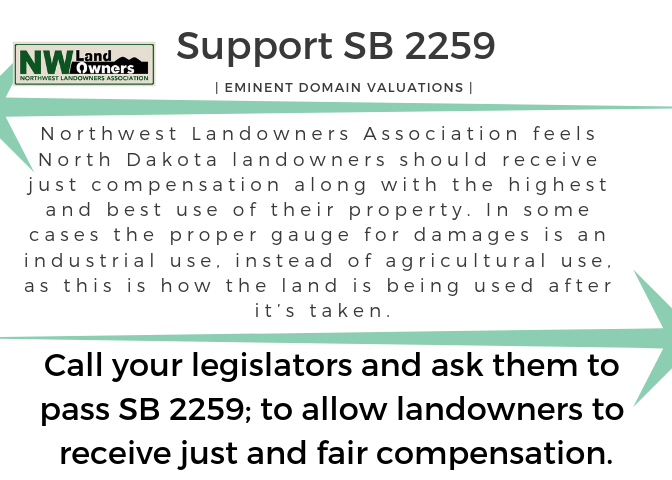
Finance And Taxation Committee Members
District 34
Senator Dwight Cook
- 701-220-3850
- dcook@nd.gov
District 26
Senator Jim Dotzerod
- 701-640-3926
- jdotzenrod@nd.gov
District 39
Senator Dale Patten
- 701-570-4908
- dpatten@nd.gov
Do you have additional questions?
Call our board members active at the Capitol:
Troy Coons, Chairman: 701.721.4258
Dave King, Vice Chairman: 701.848.6032
Amy Shelton, ED: 701.721.4446
District 4
Senator Jordan Kannianen
- 701-421-8813
- jkannianen@nd.gov
District 18
Senator Scott Meyer
- 218-791-7655
- scottmeyer@nd.gov
District 33
Senator Jessica Unruh
- 701-891-9708
- jkunruh@nd.gov
Legislative Bill Tracking – Sixty-sixth Assembly (2019) – Bill Tracking List
This week at the Capitol: Jan 7-11
- Bills on Wind Liens, Eminent Domain, Reclamation Bonds, Landlord / Tenant, Market Value Cap, and Baseline Testing are the main topics NWLA is lobbying for in the 2019 Session.
Legislative Leaders
- In the 66th Legislative Assembly, there are 79 republicans and 15 Democrats in the House of Representatives and 37 Republicans and 10 Democrats in the Senate. Republican and Democratic House and Senate members have selected the following leaders for the 2019 Legislative Session: House and Senate.
2019 Agriculture Committees:
- Senate Ag Committee Members Larry Luick (R) – Chairman Janne Myrdal (R) – Vice Chairman Jerry Klein (R) Oley Larsen (R) Arne Osland (R) Kathy Hogan (D) House Agriculture Committee Members Dennis Johnson (R) – Chairman Wayne A. Trottier (R) – Vice Chairman Jake G. Blum (R) Ruth Buffalo (D) Gretchen Dobervich (D) Jay Fisher (R) Craig Headland (R) Dwight Kiefert (R) Aaron McWilliams (R) David Richter (R) Bernie Satrom (R) Cynthia Schreiber-Beck (R) Kathy Skroch (R) Bill Tveit (R)
Contacting Your Legislators
- During a legislative session, a legislator can be reached at the State Capitol by leaving a message with the legislative telephone message center at (888) NDLEGIS (635-3447) or (701) 328-3373 (local). That number can also be used to obtain information on bills under consideration. A legislator can also be reached by mail or email and address rosters are posted at http://www.legis.nd.gov/contact-my-legislators.
LEGISLATIVE DEADLINES AND EVENTS
- Jan. 14 – Deadline for representatives to introduce bills
- Jan. 21 – Deadline for senators to introduce bills
- Feb. 22 – Crossover for bills
- Feb. 25-26 – Recess
- March 6 – Crossover for resolutions
- April 19 – Good Friday
- April 30 – Session is limited to 80 legislative days
- Detailed information on legislative activities is available on the Legislative Assembly website.
NWLA 2017 Impact
2017 Legislative Session
- HB 1151:The “Spill Bill” would no longer require companies to report spills of crude oil, produced water, or natural gas that are contained to a well site or production location and are less than 10 barrels (420 gallons). The current rule is to report spills of 1 barrel or more. This bill has been signed by Gov. Burgum NWLA is NOT in support of this legislation.
- SB 2236: This legislation would make permanent the Ombudsman Program, which was established in the 2015 Legislative Session through a bill that NWLA championed. NWLA is in support of this legislation. This bill was passed.
- SB 2327:This bill would create the Division of Environmental Quality. NWLA recommended consideration of an amendment to allow for ⅓ representation on the board by agricultural representatives. NWLA feels this ratio is justified by the estimation that 90% of North Dakota’s land is utilized for agricultural purposes and ¼ of our economy is agriculturally based. This bill has been approved at ⅓ representation agricultural representatives on the Division of Environmental Quality board. This legislation has been passed. NWLA is in support of this legislation.
- SB 2333:This legislation was introduced by NWLA and moved rule for DMR guidance into law 38-08. This legislation handles reclamation of all land, on and off site of oil well pads; and provides soil protection. This legislation passed and was championed by NWLA.
- HB 1244: This bill is a quick take by the water boards and will most likely be killed. This legislation did not pass. NWLA is in support of this legislation.
- HB 1020: This bill would implement taxation of fresh water sold by landowners, with funds going towards WAWS. This segment of legislation did not pass. NWLA is NOT in support of this portion of this legislation.
- SB 2313: Wind oversight and Reclamation legislation. NWLA recommendation is to have the PSC in charge. The Ombudsman program that was created in 2015 has been expanded with a memorandum of understanding for the Agricultural Department to work with PCS pipeline and wind farm development.
- SB 2331: The “Sampling Bill” relates to the protection of groundwater and other responsibilities of a mineral developer. It would require that soils and groundwater be sampled on oil and gas sites to provide a background record for spill cleanup. NWLA introduced and is in support of this legislation. This legislation did not pass.
- SB 2047:Same as HB 1244, looking to add provisions of SB 2332 (Eminent Domain compensation) to it. The amendments from SB 2332 did not pass. NWLA is in support of this legislation.
- SB 2156: The “Radioactive Waste” bill. This legislation was passed without the amendments. NWLA was in support of the bill and amendments. Amendments to this bill were added to address concerns of local elected officials representing the residents. The amendments would have made the local elected officials to the first to be notified.
- SB 2332:The “Eminent Domain Bill”. This legislation failed to pass. NWLA introduced and is in support of this legislation.
- Additional bill monitored by NWLA were, HB 1336, HB 1187, HB 1282, HB 1293, SB 2313, SB 2263, SB 2286, SB 2036, SB 2225, SB 2314, SB 2134, SB 2027.
- NWLA was able to get an amendment into the PCS budget for a wind farm study. This study will help guide the agency and aid the property owners with the effects of a wind farm.
- Through the entire legislative session, a representative from NWLA was present 85% of the time. Several meetings were held with the PCS, DMR, Health Department, Majority and Minority leaders and the Industrial Commission( Agricultural Commissioner, North Dakota Governor Burgum, and the Attorney General.)
Northwest Landowners Association NDSU Brine Spill Café talks
- NWLA sponsored three cafe style talks to educate landowners. During this open conversation between landowners and soil specialist; we discussed the severity of brine spills, what a landowner can do if they see a brine spill on their property, and the different means of reclamation used after a spill. NDSU Extension Services and the NWLA urges all landowners to report spills of any size immediately and to take pictures of the spill site.
Hydrocarbon Remediation workgroups
- Several NWLA board members are currently in negotiations for setting new guidelines for remediation and reclamation protocols; along with new standards.
Other involvements
- Working with counties on uncompensated right of way takings
- Mountrail County Tax equalization
- DMR Rule making
- Wind meetings
- Pipeline meetings
- Established brine spill guidelines with ND Health Department



